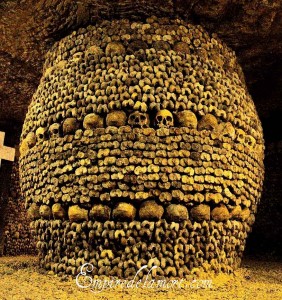 We frame our lives in stories—stories about what we have done and stories about what we will someday do. But how do you tell a story that has no clear ending? Death, even the mere notion of it, disrupts the narrative framework of our lives. This course will examine writers’ attempts to overcome that disruption and make meaning from death. Readings will include short selections of the fiction, drama, philosophy, poetry, and memoir of various authors, from Plato, Dante, and Shakespeare to Emily Dickinson, Raymond Carver, Kurt Vonnegut and Mary Roach.
We frame our lives in stories—stories about what we have done and stories about what we will someday do. But how do you tell a story that has no clear ending? Death, even the mere notion of it, disrupts the narrative framework of our lives. This course will examine writers’ attempts to overcome that disruption and make meaning from death. Readings will include short selections of the fiction, drama, philosophy, poetry, and memoir of various authors, from Plato, Dante, and Shakespeare to Emily Dickinson, Raymond Carver, Kurt Vonnegut and Mary Roach.
Meets: Saturday, October 8, 2011 – Saturday, November 12, 2011
10:00 AM to 12:00 PM at Richard Hugo House
General: $230.00
Members of Hugo House: $207.00
[mappress]
Click here for information on registration and financial aid.
Required Readings
Week 1
Emily Dickinson, “Because I could not stop for Death,” “I heard a Fly buzz,” “Death is like the insect,” and “After great pain” (poems)
Rebecca Brown, “The Gift of Speech” and “The Gift of Sight” from The Gifts of the Body (fiction)
Week 2
Plato, Phaedo (philosophy)
Jack London, “The Law of Life” (story)
Week 3
Shakespeare, “To be, or not to be” soliloquy from Hamlet (drama)
Dylan Thomas, “Do not go gentle into that good night” (poem)
DH Lawrence, “The Ship of Death” (poem)
Rita Dove, “Old Folk’s Home, Jerusalem” (poem)
Week 4
Raymond Carver, “What the Doctor Said” (poem) and “A Small, Good Thing” (story)
Dante, Canto’s I-IV from The Inferno (poem)
Week 5
Mary Roach, “A Head Is a Terrible Thing to Waste” and “How to Know if You’re Dead” from Stiff: The Curious Lives of Human Cadavers (non-fiction)
Gerald Stern, “Bob Summers’ Body” (poem)
Tim O’Brien, “The Lives of the Dead” (story)
Week 6
Roland Barthes, “The Death of the Author” (philosophy/criticism)
To come…
(discussion questions will be posted here a few days before each meeting)